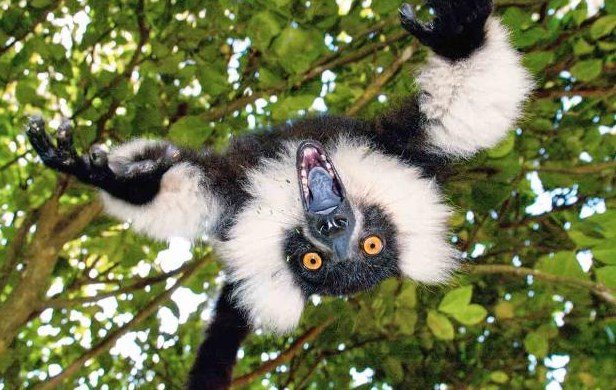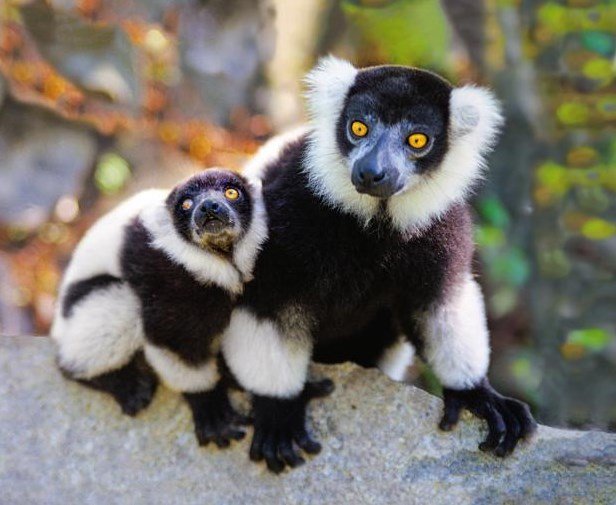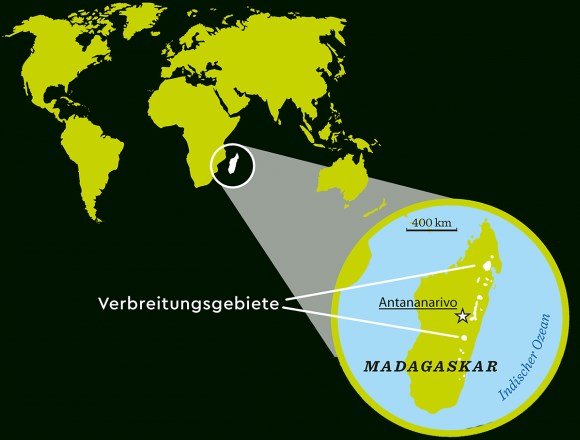Black-and-white Varis stick together: even the offspring train them in teamwork. If the monkeys would just talk less ...

Loud: Black and white Varis scream - and how! In this way they communicate with each other. They prefer to call in chorus!
Black and White Varis: The Lemurs of Madagascar
High up in the treetops of Madagascar's rainforests, the wetland monkeys live in groups of up to 16 animals. Together, black and white Varis not only defend their territory. The entire gang also takes care of the cubs of the clique.
Researchers are amazed by these "lemur kitas": such a behavior is rare among mammals. Only a few primate species, including humans, entrust babysitters to their offspring.
In the Vari-Wohngemeinschaft the care model works splendidly. If the mother is looking for food, several guardians jump in, females and males, and guard the nest. In fact, Varis give birth to their young in nests of leaves and twigs! In the crowns of the trees, the little ones are safe from enemies like the fossos.
These feline hunters are Madagascar's largest predators and like to eat lemurs. But the nursery at dizzy heights also has its drawbacks: sometimes young Varis fall out of the nest. But that rarely happens because the babysitters do their job well. Scientists have found that occasional hatchlings survive even more often than the few exceptions raised only by their mothers.

Young Varis are completely helpless in the first two weeks of life and need their mother around the clock. after ten weeks, they are already doing their own gymnastics through the treetops
The Varis in Africa are threatened
Nevertheless, there are fewer and fewer black and white Varis on Madagascar. As is so often the case, people are responsible for this: They are clearing away the island's rainforests and thus taking their living space for the animals. In addition, many of the inhabitants of Madagascar are so poor that they hunt the lemurs to feed their families with the meat. They also earn some money by selling the beautiful skins.
Unfortunately, black-and-white Varis often reveal themselves when hunters search for them: because they like to chatter. More specifically, barking, screaming, growling, howling and squealing. These sounds probably promote cohesion in the group and help vociferously to mark the area. Unfortunately, the noisemakers are also terribly easy to find, and their species is now even threatened with extinction.
After all, animal rights activists are trying to resettle Varis, who grew up in zoos, in Madagascar's rainforests. Fortunately, the lemurs also like to get offspring in human care - and also rely on the babysitter of their gang in the zoo.

Black and white varis live on Madagascar
General to the Black and White Varis
Black and white Varis, scientifically Varecia variegata , are among the wet-nosed monkeys. The lemurs live exclusively on the island of Madagascar off the southeast coast of Africa; the stock is currently estimated at under 10,000 animals. In addition to the black-and-white Varis, there are also Red Varis on Madagascar.
Size and weight of the monkeys
Her body is 50 to 60 inches long, the tail another 60 centimeters. On average, the tree dwellers weigh between 3.2 and 4.5 kilograms.
Food: What do Varis eat?
Varis love to eat fresh fruit. With their long, narrow tongues, they can also lick nectar from flowers.
Reproduction and offspring
After a gestation period of 99 to 106 days, the female gives birth to an average of two to three cubs.